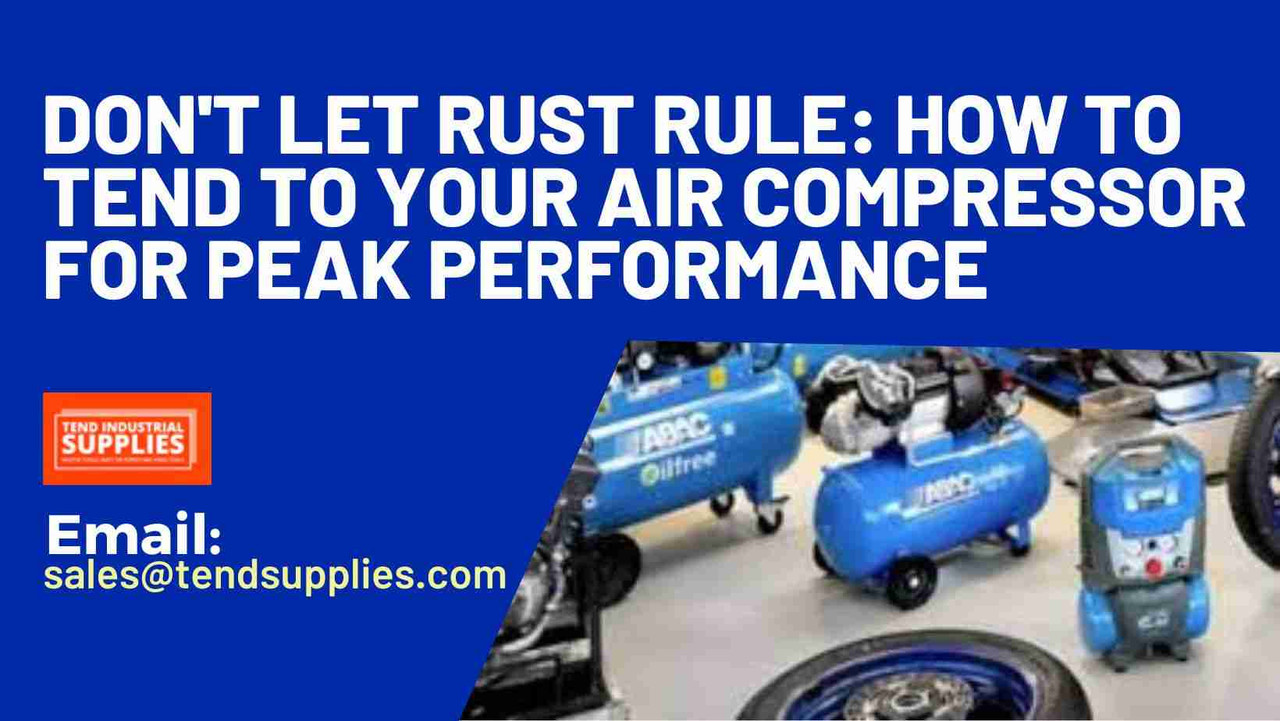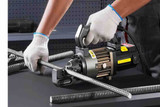Don't Let Rust Rule: How to Tend to Your Air Compressor for Peak Performance
Air compressors are the unsung heroes of workshops and industrial sites, powering everything from pneumatic tools to intricate machinery. Their ability to convert power into kinetic energy by compressing and pressurizing air is crucial for many applications, ensuring operations run smoothly and efficiently. However, this indispensable tool faces a formidable adversary: rust and corrosion. Left unchecked, these elements can drastically diminish an air compressor's efficiency and lifespan, leading to costly repairs or replacements and significant downtime.
Key Takeaway
The key takeaway from this article is that proactive maintenance and rust prevention are essential for preserving the efficiency, performance, and lifespan of your air compressor. By understanding the root causes of rust formation and implementing effective moisture control techniques, regular inspections, and corrosion-resistant components, you can significantly extend the life of your air compressor. Remember, the longevity and reliability of your air compressor are in your hands, and with the proper care and attention, you can prevent rust from ruling over your valuable equipment.
Understanding Air Compressor Rust Formation
Moisture is the primary culprit behind rust formation in air compressors. As air compressors operate, they inherently produce condensation within the tank and system components. If not properly managed, this moisture can lead to rust, particularly within the air tank, where water tends to accumulate. Environmental factors, such as high humidity levels or operation in damp conditions, exacerbate this issue, as do lapses in regular maintenance and improper compressor handling.
Preventive Measures Against Rust
Combatting rust formation in air compressors requires a proactive approach focused on moisture control and preventive care:
- Moisture Control Techniques: Incorporating aftercoolers, dryers, and water separators into your air system can significantly reduce the moisture content of compressed air. Aftercoolers cool the air immediately after compression, causing moisture to condense and separate from the air. Dryers remove moisture through refrigeration (for lower moisture levels) or desiccant materials (for extremely dry air). Water separators, installed downstream, catch and remove the condensed water from the air flow.
- Proper Installation: Positioning your air compressor in a well-ventilated, dry area minimizes the risk of environmental moisture affecting the unit. Adequate ventilation ensures that any moisture the compressor generates during operation is quickly dissipated, rather than lingering and contributing to corrosion.
- Regular Drainage: One of the most straightforward yet essential practices for preventing rust is the regular drainage of the compressor tank. Draining the tank after each use prevents water from sitting and rust from forming. Most modern compressors are equipped with easy-to-use drain valves to facilitate this process.
Related Article: 2024's Leading Air Compressors: Comprehensive Reviews and Buyer's Guide
Routine Maintenance for Rust Prevention
Establishing and adhering to a routine maintenance schedule is key to keeping your air compressor free from rust:
- Inspection Schedule: Regularly inspect your air compressor for any signs of rust or corrosion, particularly in areas prone to moisture accumulation. Early detection can prevent minor surface rust from developing into a more significant problem that compromises the compressor's integrity.
- Lubrication: Proper lubrication is crucial in rust prevention, especially for moving parts exposed to air and moisture. Use the recommended lubricant to create a protective barrier against corrosion.
- Cleaning and Protective Coatings: Keeping the compressor clean from dust, dirt, and grime prevents moisture from clinging to the surface, where it can promote rust. Applying protective coatings to metal parts, especially those exposed to harsh conditions, can further safeguard against corrosion.
Let's pause here before diving deeper into identifying, addressing early signs of rust, and exploring advanced solutions for rust management.
Detecting and Addressing Rust Early
Early detection and prompt action are paramount in managing rust on your air compressor effectively:
- Identification Tips: Regular visual inspections are your first defense against rust. Look for discoloration, flaking metal, or any signs of corrosion, especially around joints, under the tank, and near the air outlets. Pay attention to changes in performance, as these can also indicate internal issues.
- Immediate Actions: If you detect rust, assess the extent of the corrosion. Surface rust can often be treated by cleaning the area with a wire brush or sandpaper then applying a rust inhibitor or a fresh coat of paint designed for metal surfaces. For internal rust, especially within the tank, a professional assessment is advised to determine if repair or replacement is needed.
Advanced Solutions for Rust Management
For air compressors that are heavily utilized or are in environments prone to moisture, considering more advanced solutions for rust management might be necessary:
- Tank Replacements and Upgrades: If rust has compromised the structural integrity of the air compressor tank, replacing it or upgrading to a new model might be the safest option. Consider corrosion-resistant tanks or those with an internal coating for added protection against rust.
- Investing in Corrosion-Resistant Components: Look for air compressor components made from materials less prone to rust, such as stainless steel or those with protective coatings. Upgrading to these components can significantly reduce the risk of rust formation and extend the lifespan of your compressor.
Best Practices for Air Compressor Operation
Adopting best practices for air compressor operation can further minimize the risk of rust:
- Opt for optimal compressor cycling to avoid overuse in high humidity conditions, which can exacerbate moisture accumulation.
- Ensure that the compressor is used and stored as dry as possible. If humidity levels are consistently high, consider using a dehumidifier in the storage area.
- Familiarize yourself with your model's specific maintenance needs and adhere to the manufacturer's recommendations for care and operation.
By integrating these practices into your regular maintenance routine, you can effectively combat rust and maintain the peak performance of your air compressor, ensuring it continues to serve as a reliable power source for your tools and projects.
Let's conclude with some actionable advice, a call to action, and answers to frequently asked questions about maintaining air compressors in optimal condition.
Rust can significantly undermine your air compressor's efficiency, performance, and lifespan, making regular maintenance and proactive rust prevention measures indispensable. By understanding the causes of rust formation and implementing strategies to counteract these factors, you can protect your investment and ensure your air compressor remains a reliable asset for your projects. Embrace routine inspections, moisture control techniques, and corrosion-resistant components as part of your comprehensive care plan. Remember, the longevity of your air compressor is directly linked to the effort you put into maintaining it.
Call to Action
Don't let rust dictate the performance and lifespan of your air compressor. Visit Tend Industrial Supplies for more tips, maintenance services, and access to a wide range of air compressor products designed to fight rust and enhance performance. Our experts are ready to assist you with personalized recommendations and support, ensuring you have the tools and knowledge to keep your air compressor in peak condition. Reach out to us at sales@tendsupplies.com for all your air compressor needs.
FAQ Section
- How often should I drain the moisture from my air compressor tank?
- It's advisable to drain the tank daily or after each use, especially in humid environments, to prevent moisture accumulation and rust formation.
- What type of lubricant should I use for my air compressor?
- Use a lubricant specifically designed for air compressors. Check your manufacturer’s recommendations for the best choice for your specific model.
- Can the air compressor tank rust be repaired, or does it require replacement?
- Minor surface rust can often be treated and painted over, but significant corrosion, significantly that compromising the tank's integrity, typically requires replacement. Always consult with a professional for an accurate assessment.
- Are there any signs of rust I should look for in hard-to-see areas?
- Listen for changes in operation sounds, check for leaks, and monitor for a drop in performance, as these can indicate internal rust or corrosion. Use inspection cameras or seek professional inspections for a thorough evaluation.
- Do all air compressors face rust issues, or are some more resistant?
- All air compressors can be susceptible to rust due to moisture, but models with corrosion-resistant coatings, stainless steel components, or designed specifically for high-moisture environments may be more resistant.
Adopting a proactive approach to maintenance and being vigilant about rust prevention will ensure the optimal performance of your air compressor and safeguard your investment, keeping your equipment operational for years to come.









